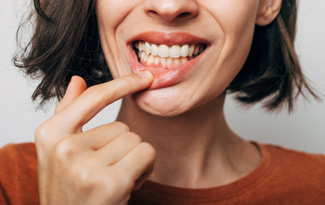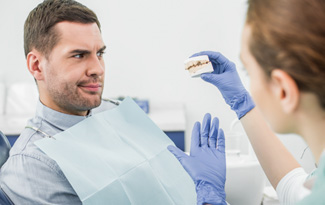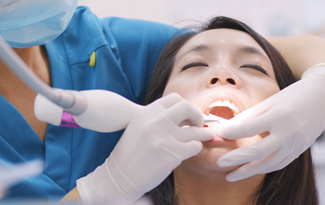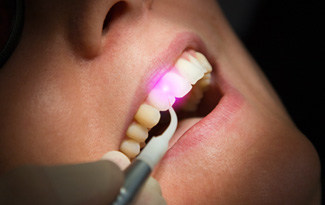Gum Disease Treatment – Lincoln, NE
Rejuvenate Your Gums for a Healthier Smile
 At Smile Specialties, Dr. Jennifer Reed and our
team prioritize the foundation of your oral health which is essential for long-lasting restorative dental work.
Detecting and treating gum disease early is critical to maintaining a healthy smile. That is why we work diligently
to treat your mouth and prevent complications. Read more below to learn all about gum disease and how we treat it.
Then, give us a call to schedule your initial
consultation and protect your smile!
At Smile Specialties, Dr. Jennifer Reed and our
team prioritize the foundation of your oral health which is essential for long-lasting restorative dental work.
Detecting and treating gum disease early is critical to maintaining a healthy smile. That is why we work diligently
to treat your mouth and prevent complications. Read more below to learn all about gum disease and how we treat it.
Then, give us a call to schedule your initial
consultation and protect your smile!
Why Choose Smile Specialists for Gum Disease Treatment?
- Experienced Prosthodontist With Decades Of Experience
- Fast, Effective Treatment With Modern Dental Technology
- Friendly Dental Team Ready To Meet Your Needs
What is Gum Disease?
 Gum disease, also known as periodontal disease, is an infection caused by bacterial plaque buildup along your
gumline. This condition can progress through stages, starting as gingivitis (mild gum inflammation) and potentially
worsening into periodontitis. If left untreated, gum disease can damage the tissues and bone supporting your teeth,
leading to tooth loss and other health complications. Routine dental checkups and good oral hygiene habits are
crucial in preventing and managing gum disease, especially if it progresses to a later stage.
Gum disease, also known as periodontal disease, is an infection caused by bacterial plaque buildup along your
gumline. This condition can progress through stages, starting as gingivitis (mild gum inflammation) and potentially
worsening into periodontitis. If left untreated, gum disease can damage the tissues and bone supporting your teeth,
leading to tooth loss and other health complications. Routine dental checkups and good oral hygiene habits are
crucial in preventing and managing gum disease, especially if it progresses to a later stage.
Symptoms of Gum Disease
 So, how do you know if gum disease is an issue for you? There are several signs that can help you recognize gum
disease early to prevent it from advancing. Common symptoms include:
So, how do you know if gum disease is an issue for you? There are several signs that can help you recognize gum
disease early to prevent it from advancing. Common symptoms include:
- Red, swollen, or tender gums
- Bleeding during brushing or flossing
- Persistent bad breath
- Receding gums or teeth appearing longer
- Loose or shifting teeth
If you notice any of these issues, it's important to schedule a consultation with Dr. Reed to have your gums
examined. From there, she will discuss treatment options with you and create a personalized plan to meet your needs.
How Do We Treat Gum Disease?
 At Smile Specialties, we take a comprehensive approach to treating gum disease. Depending on the severity of your
condition, we may recommend different treatments to restore the health of your smile.
At Smile Specialties, we take a comprehensive approach to treating gum disease. Depending on the severity of your
condition, we may recommend different treatments to restore the health of your smile.
Scaling & Root Planing
 Scaling and root planing is a deep cleaning procedure that removes harmful bacteria from beneath the gumline. Our
team smooths the surfaces of tooth roots to make it harder for bacteria and plaque to reattach. This thorough
cleaning helps stop the infection from progressing and promotes healing.
Scaling and root planing is a deep cleaning procedure that removes harmful bacteria from beneath the gumline. Our
team smooths the surfaces of tooth roots to make it harder for bacteria and plaque to reattach. This thorough
cleaning helps stop the infection from progressing and promotes healing.
Laser Periodontal Treatment
 With our state-of-the-art ZAP laser, we can precisely remove diseased gum tissue and treat deep periodontal pockets
comfortably. Laser treatment minimizes discomfort and enhances healing while effectively treating gum disease right
at its source.
With our state-of-the-art ZAP laser, we can precisely remove diseased gum tissue and treat deep periodontal pockets
comfortably. Laser treatment minimizes discomfort and enhances healing while effectively treating gum disease right
at its source.
Antibiotic Treatment
 Antibiotic treatment is typically used in conjunction with the above treatment methods to compound their
effectiveness. This blocks and eliminates bacteria that may have been left behind. Dr. Reed recommends both
Periostat and tetracycline-containing gel as needed.
Antibiotic treatment is typically used in conjunction with the above treatment methods to compound their
effectiveness. This blocks and eliminates bacteria that may have been left behind. Dr. Reed recommends both
Periostat and tetracycline-containing gel as needed.
These treatments help to stop the progression of gum disease, protect your teeth, and rejuvenate your gums for a
healthier smile. So, if you’re experiencing the symptoms, don’t hesitate to reach out to us at Smile
Specialties today to schedule your
consultation and discuss your options.